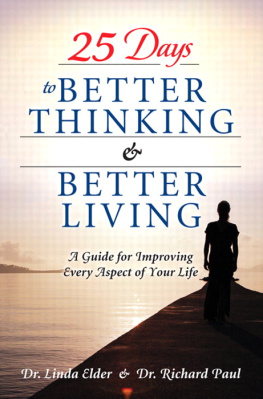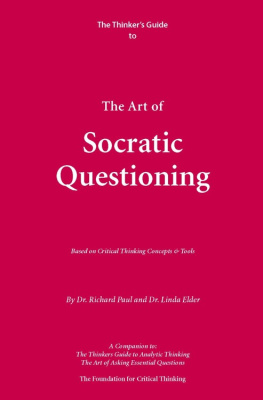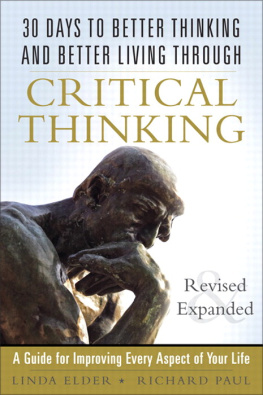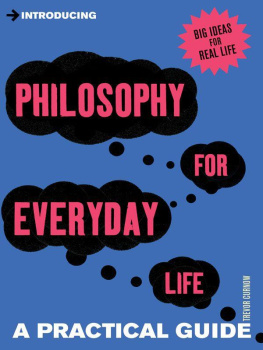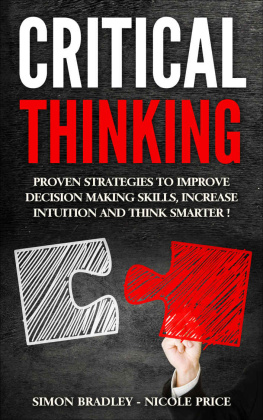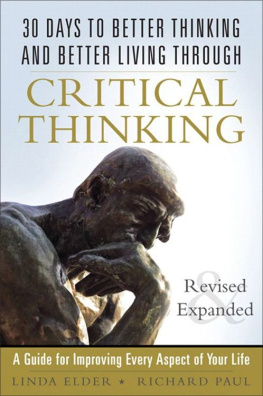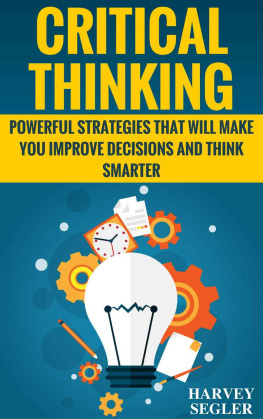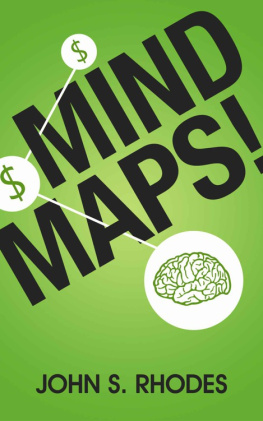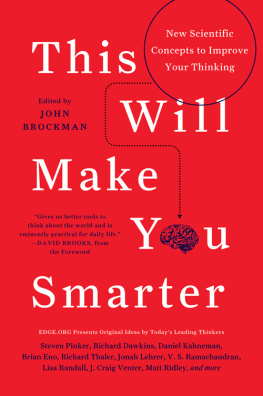Copyright
Library of Congress Cataloging-in-Publication DataElder, Linda, 1962- 25 days to better thinking and better living : a tool kit for improving every aspect of your life / Linda Elder and Richard Paul. p. cm. Includes bibliographical references (p. ). ISBN 0-13-173859-3 (hardback : alk. paper) 1. Critical thinking. 2. Self-actualization (Psychology) 3. Quality of life. I. Paul, Richard. II. Title. BF441.E4 2006 153.42--dc22 2005030768
Vice President, Editor-in-Chief: Tim MooreExecutive Editor: Jim BoydEditorial Assistant: Susan AbrahamDevelopment Editor: Russ HallAssociate Editor-in-Chief and Director of Marketing: Amy NeidlingerCover Designer: Alan ClementsManaging Editor: Gina KanouseSenior Project Editor: Lori LyonsCopy Editor: Gayle JohnsonSenior Indexer: Cheryl LenserProofreader: Debbie WilliamsInterior Designer/Senior Compositor: Gloria SchurickManufacturing Buyer: Dan Uhrig
2006 by Pearson Education, Inc.Publishing as Prentice HallUpper Saddle River, New Jersey 07458
Prentice Hall offers excellent discounts on this book when ordered in quantity for bulk purchases or special sales. For more information, please contact U.S. Corporate and Government Sales, 1-800-382-3419, .
Company and product names mentioned herein are the trademarks or registered trademarks of their respective owners.
All rights reserved. No part of this book may be reproduced, in any form or by any means, without permission in writing from the publisher.
Printed in the United States of America
First Printing, March 2006
Pearson Education LTD.Pearson Education Australia PTY, Limited.Pearson Education Singapore, Pte. Ltd.Pearson Education North Asia, Ltd.Pearson Education Canada, Ltd.Pearson Educatin de Mexico, S.A. de C.V.Pearson EducationJapanPearson Education Malaysia, Pte. Ltd.
Dedication
To all those who use their thinking to expose hypocrisy and self-deception, and who work to create what is now but a remote dreama just and humane world.
Additional Books Written by Richard Paul and Linda Elder
Critical Thinking: Tools for Taking Charge of Your Professional and Personal Life
Critical Thinking: Tools for Taking Charge of Your Learning and Your Life
Critical Thinking: Learn the Tools the Best Thinkers Use
Written By Richard Paul and Linda Elder
Titles Include:
Critical Thinking: Concepts and Tools
Analytic Thinking: How to Take Thinking Apart and What to Look for When You Do
How to Detect Media Bias and Propaganda in National and World News
Fallacies: The Art of Mental Trickery and Manipulation
Taking Charge of the Human Mind
How to Read a Paragraph: The Art of Close Reading
How to Write a Paragraph: The Art of Substantive Writing
Understanding the Foundations of Ethical Reasoning
The Art of Asking Essential Questions
Critical Thinking: How to Survive in a Rapidly Changing World
Praise for 25 Days to Better Thinking & Better Living
The key to every man is his thought. |
| -- Emerson |
Of all knowledge, the wise and good seek most to know themselves. |
| -- Shakespeare |
Do you want to know the man against whom you have most reason to guard yourself? Your looking-glass will give you a very fair likeness of his face. |
| -- Whately |
The first step to knowledge is to know that we are ignorant. |
| -- Cecil |
The more you practice what you know, the more shall you know what to practice. |
| -- W. Jenkin |
Thinking is the hardest work there is, which is the probable reason why so few engage in it. |
| -- Henry Ford |
Acknowledgments
A special acknowledgment is due to Gerald Nosichdedicated thinker, exemplary scholar, lifelong friend, and colleague.
About the Authors
Dr. Linda Elder is an educational psychologist, Executive Director of the Center for Critical Thinking, and President of the Foundation for Critical Thinking. She is highly published and has done original research into the relation of thought and emotion and into the stages of critical thinking development. She is a regular keynoter at the International Conference on Critical Thinking, is highly sought after as a presenter, and is a recognized leader in critical thinking.
Dr. Richard Paul is Director of Research and Professional Development at the Center for Critical Thinking and Chair of the National Council for Excellence in Critical Thinking. He is an internationally recognized authority on critical thinking, with nine books and more than 200 articles on the subject. His views on critical thinking have been canvassed in the New York Times , Education Week , The Chronicle of Higher Education , American Teacher , Readers Digest , Educational Leadership , Newsweek , and U.S. News and World Report .
The works of Linda Elder and Richard Paul have been translated into Spanish, French, German, Italian, Japanese, and Chinese. Translations are underway in Russian, Malay, and Korean. The growing demand for translations into increasing numbers of languages testifies to the emerging international recognition of the importance of critical thinking in human life and work and of the authoritative nature of the contribution of Paul and Elder in the field.
The Foundation for Critical Thinking seeks to promote essential change in society through the cultivation of fair-minded critical thinking, thinking predisposed toward intellectual empathy, humility, perseverance, integrity, and responsibility. In a world of accelerating change, intensifying complexity, and increasing interdependence, critical thinking is now a requirement for economic and social survival. Contact the Foundation for Critical Thinking at www.criticalthinking.org.
Preface
Thinking leads man to knowledge. He may see and hear, and read and learn whatever he pleases, and as much as he pleases; he will never know anything of it, except that which he has thought over, that which by thinking he has made the property of his own mind. |
| -- Pestalozzi |
There is nothing we do as humans that does not involve thinking. Our thinking tells us what to believe, what to reject, what is important, what is unimportant, what is true, what is false, who are our friends, who are our enemies, how we should spend our time, what jobs we should pursue, where we should live, who we should marry, how we should parent. Everything we know, believe, want, fear, and hope for, our thinking tells us.
It follows, then, that the quality of our thinking is the primary determinant of the quality of our lives. It has implications for how we go about doing literally everything we do.
The quality of your work is determined by the quality of your thinking as you reason through the problems you face as you work. The quality of your relationships is determined by the thinking you do about and in those relationships. Right now, as you read this book, the very sense you make of it is a product of your thinking. Your ability to understand and internalize the ideas it contains will be determined by the quality of your thinking as you read it.

